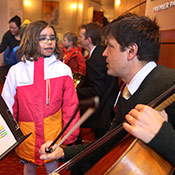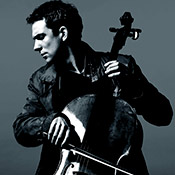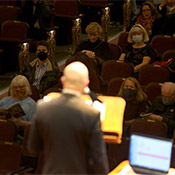
Conductor Han-Na Chang Takes the Podium
David Lewellen
PUBLISHED
Tagged Under: 2022.23 Season, Classics, Conductor
Han-Na Chang, who will lead the Milwaukee Symphony’s concerts on Feb. 24-25, was an international cello soloist before she became an international conductor. When she conducts a cello concerto, does she give input on fingering or bowing?
“Nooo!” she says by phone, with a laugh. Then she clarifies: “Playing an instrument is a very physical thing, and everyone has their own thing with their own instrument.” Zlatomir Fung, a rising young cello star, will be performing Tchaikovsky’s Variations on a Rococo Theme with the MSO, but Chang says, “I’m not there to teach him how to play cello.”
Nevertheless, Chang did have an impressive cello career of her own, appearing with many of the world’s top orchestras, before she began wondering what else was out there. “The cello repertoire is quite small compared to other instruments like piano or violin,” she says. Just for a personal challenge, she began to study the scores of great symphonies, “and one day, Beethoven just came alive in the score. It’s the most miraculous music ever composed. And I thought, oh my goodness, I have to perform and interpret Beethoven.” She began to fit in conducting lessons around her cello schedule and made her debut in 2007 in her native Korea.
It has been many years now since Chang performed on cello. “Both are full-time jobs,” she says. “If I wanted to stay at the top, I’d have to put in five or six hours of practicing every day, and for conductors, the studying never stops. There was a choice to be made, and for me, it was a no-brainer.”
Chang’s experience as an orchestral cellist was limited to her student years at Juilliard, but blending with a group of other musicians on the same part still gave her valuable insight as a conductor. “You know what you’re asking for, and they know that you know,” she says.
As a guest conductor, part of her preparation for her week with the MSO was talking with librarian Paul Beck about the orchestra’s existing copies of the music – in this case, Shostakovich’s Fifth Symphony. But she doesn’t plan to innovate. “The orchestra’s used to a certain bowing. It’s already in their system,” she said, and there is no need to alter the composer’s original markings.
But when she arrives for the first rehearsal, she will be working to get on the same wavelength quickly. “I’ll see how the orchestra reacts to me and how I react to them,” she says. “It may seem like the conductor is waving a stick and everyone is following, but that’s so far from the truth.”
When the MSO suggested her concert be built around the Shostakovich symphony, she said yes immediately because she loves the piece but hasn’t conducted it for several years. Then Bret Dorhout, the MSO’s vice president of artistic planning, suggested the Tchaikovsky Variations on a Rococo Theme for the first half and engaged Fung to be the soloist.
It will be Chang’s first time working with Fung, but she says, “I’ve heard so many wonderful things, and I’m excited to get to know him.” When the two of them meet before the first rehearsal to talk about the piece, the conversation will be about phrasing and interpretation, just as it would be for a pianist or violinist.
In addition to guest conducting engagements, Chang is the music director of the Trondheim Symphony in Norway. “The beauty of a long-term relationship is that sometimes just a glance is enough,” she says. But when she stands in front of the MSO for the first time, “I’m super excited to get to know the musicians and see where the music takes us.”
As if mastering two disciplines in music wasn’t enough, Chang also enrolled at Harvard University to study philosophy. She credits the example of the late conductor Giuseppe Sinopoli, who also completed a degree in archaeology as an adult and who mentored her as a young cellist. “He told me that music should never be the only thing in your life,” she says.
But, she adds, she never finished that degree. “I got in touch with them during the pandemic, after 17 years, and they said I could come back,” she says, “but by then the concert halls were opening up, and I had to defer again.”



